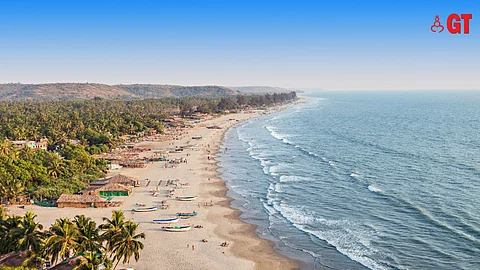

SRIDHAR D IYER
The azure blue of the Arabian Sea has a hypnotic hold on all who behold it, as they are beckoned to indulge in the pleasures that the beaches of Goa offer them. But as beautiful as the sea may be, so it can be dangerous, and it is best to exercise caution when engaging in fun and frolic at the beach.
TYPES OF BEACHGOERS
There are five types of beachgoers. The first enjoy strolling along the shore. The second type go for a swim, proficient or not or even if they don’t know how to swim. The third prefer to stand or sit in knee-deep or shoulder-deep water, drink beer and take pictures.
The fourth are adventurous and opt for water sports. Then there is the foolhardy type that venture out on dangerous, slippery rocks or in a drunken state into the sea.
Our safety on the beach may be at risk owing to natural or man-made causes.
SAFETY CONCERNS
Being cautious in the sea is important, given its unpredictable nature. Our safety on the beach may be at risk owing to natural or man-made causes.
NATURAL CAUSES
People assume that the sea is treacherous only during the monsoons. However, even walking along the shoreline, where the sands are compact and easy to tread, could be dangerous if suddenly a huge wave rushes onto the beach.
It is better to walk along the intertidal zone (ie, between low and high tide levels) even if it is difficult due to the loose sand. This would increase your stamina and keep you at arms-length from the seawater.
Rip currents are silent killers as these occur below the water and a few metres from the shore. Rip currents drag people into deep waters. The best of swimmers would struggle when caught in them. Experts advise to stay calm and swim parallel to the coast.
Rocks along the coast are visible, but those offshore may be buried or not obvious below the water.
Rocks along the coast are visible, but those offshore may be buried or not obvious below the water. Swimmers have to be careful of these as they could be injured by them.
Let not the smooth, gentle sandy nearshore fool you, because if you walk, wade or swim towards the sea the slope could increase. You might suddenly find yourself in deep waters or trapped in rip currents.
Avoid entering waters where the sea meets the rivers because here the water level and speed and depth would change. This is because of tidal fluctuations that occur twice a day, 12-hours apart and that vary with the seasons.
MAN-MADE CAUSES
The other concern is the safety related to water sports such as group boat rides, dolphin sighting, paragliding, parasailing, etc. It is doubtful as to how much the operators know about the changing weather, tide and sea conditions.
A deterrent to negligence on the part of the operators is making them compensate customers who are injured or lose loved ones.
They need to update themselves and obtain regular weather information from service providers. Allegedly, some operators do not have licences, or any safety gear at all, or have safety gear in insufficient numbers. A deterrent to negligence on the part of the operators is making them compensate customers who are injured or lose loved ones.
Age and health restrictions should be put in place and enforced because of tragedies involving children and senior citizens. Safety measures must be maintained to avoid having swimmers and beachgoers injured by speedboats and paragliders.
MONITORING THE BEACHES
Although lifeguards stationed on most beaches in Goa carry out risky rescues, it is sometimes a thankless job with instances of them being assaulted.
To reduce human interaction leading to untoward incidents, the sea and beaches could be monitored by having boats anchored offshore, using artificial intelligence methods and self-driven robots and drones.
With red flags and warning boards not being enough to deter people from entering the sea, display boards depicting accident and death statistics might do the trick.
These could help to patrol the sea and alert people of high tide, rip currents or rogue waves and look out for vessels and swimmers in distress.
With red flags and warning boards not being enough to deter people from entering the sea, display boards depicting accident and death statistics might do the trick.
We cannot expect the customary police force to be everywhere. Hence, cops could be recruited and trained specifically for the tourism industry.
Hope you have been sufficiently cautioned, but not frightened, before you step onto the beaches!